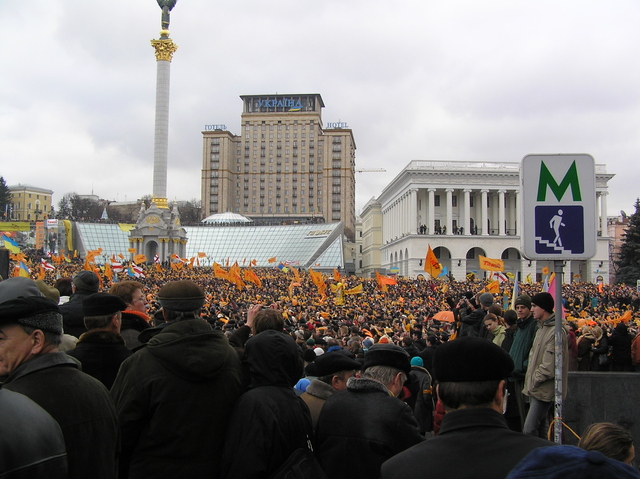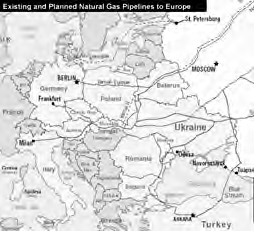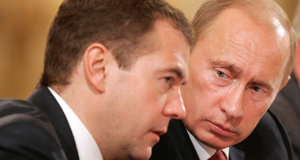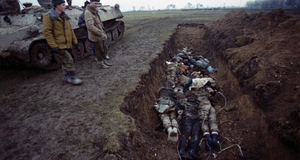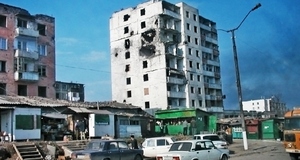From Cornell International Affairs Review VOL. 2 NO. 2Aggressive Foreign Policy as an Instrument for the Legitimization of Putin's Regime: Georgia's Case
IN THIS ARTICLE
The responsibility of Georgian President Michael Saakashvili for the war with Russia continued to be hotly debated in Georgia, Russia and the world several months after its end.1 Indeed, there are various views about Saakashvili's decision to attack South Ossetia. By the end of the war, the international community was inclined to recognize the adventurous actions of the Georgian president, but put most of the blame on Moscow for its disproportionate reaction, its bombardment of Georgian cities, its permission to South Ossetian forces to plunder Georgians villages and kill Georgians, as well as its long occupation of Georgian territory.2 An Unprecedented Confrontation with the WorldIn fact, the Russian leaders, by crossing the Georgian borders and leaving their troops on the Georgian territory after the military hostility, showed that they are not afraid of antagonizing the world or becoming isolated internationally. As a pro-Kremlin Russian author stated in the aftermath of the war, "Moscow does not have allies today."3 As a matter of fact, no one ruler in Russian history dared to confront the world in such an uncompromising way as Putin did. Never during such a critical juncture was Russia supported by so few countries as is the case in this war.4 As noted by some Moscow analysts, the Soviet Union did not experience such a high level of global hostility after the invasion of Czechoslovakia in 1968 or the invasion of Afghanistan in 1979.5 It is remarkable that Russian official media, which did its best to present Moscow's behavior in the conflict in the most flattering way, could cite only Cuba, Venezuela, Mongolia and Syria as countries that endorsed the invasion of Georgia. However, none of these countries recognized the independence of South Ossetia and Abkhazia. By the end of January 2009, only Nicaragua, underscoring Russian isolation, recognized the independence of both entities, which was highlighted in Russian media. However, so far even the countries that supposedly maintain friendly relations with Russia are not in a hurry to show their support. Various Types of Reactions to International IsolationOnly a few official journalists tried to simply deny or reduce the negative international reaction to "some aggressive forces" in the West.6 The leading reaction to the world's hostility was formulated directly by the Kremlin. First, it tried to downgrade the scale of the international opprobrium toward Moscow's actions. As Putin said in an interview with German TV, "Europe and the USA are not the whole world."7 Second, the Kremlin, particularly in the first weeks after the war, scoffed at the international condemnation, describing it as not at all dangerous to Russia. Even if the West was hostile, as Medvedev suggested, nothing dangerous could happen. He added, "We are not afraid of anything, including the prospect of a new Cold War."8 In August and September, the official media was full of articles that mocked the possible sanctions against Russia, suggesting that it would damage the West more than Russia.9 With special gusto, politicians and journalists emphasized that the West, even Europe, is not united around a policy toward Russia—a fact, which, however, does not belie the evidence that even without direct sanctions Russia is poised to suffer a lot from the international opprobrium toward its actions, particularly in the modernization of its economy.10 The Permanent Necessity of Legitimizing the RegimeIn fact, the real cause of the war and the developments that followed was neither Russia's concerns about security, the desire to protect Ossetians from "genocide" nor Russian citizens in the Caucasus. The maintenance of its authoritative regime was the Kremlin's prime purpose when it reacted to the Georgian attack and confronted the world. The existing regime, like any authoritarian regime in the contemporary world, despite the high rating of Putin, is in permanent fear of its shaky legitimization (the last presidential election was not seriously defended by anybody in Russia including the loyalists). One of the main reasons for Putin's hatred of Ukraine and Georgia is that presidents Yushchenko and Saakashvili went back to the "Orange Revolutions" in their countries in 2003-2004. In the aftermath of these revolutions, the Kremlin was in a state of panic, with a new fear, if mostly unfounded, that the "orange disease" would spread to Russia. For almost three years, the media lambasted Kiev and Tbilisi, declaring that the developments there were organized by the West.11 The idea of "sovereign democracy," which was invented to justify the authoritarian regime, was born at this time. What is more, with its concerns about a Russian Orange Revolution, the Kremlin created several big youth organizations, such as "Ours," which were officially ready to enter street battles against the opposition. Thousands of demonstrators protest in Kiev's Independence Square during the Orange Revolution November 2004. The Kremlin's fear of an Orange Revolution subsided by 2007. However, Putin and his friends, with the country still under their total control, are deeply concerned about the emergence of a real opposition. The Kremlin panics at the first sign of even a weak opposition. The top elite are afraid that a mild opposition may threaten its rule and property. Even an anti-governmental demonstration, with a few hundred participants in Moscow or Petersburg, is treated as a great emergency, which prompts the leadership to mobilize special riot units, as if the crowd is planning to march on the Kremlin. The black list of people who are banned from making appearances on TV has been increasing because even the most humble critics of the regime became "enemies of the people." Former Prime Minister Mikhail Kasianov, himself a member of the establishment, was immediately ostracized and removed from the presidential election campaign in the beginning of 2008 as soon as he declared his opposition to the regime. Even Mikhail Khodorkovsky is perceived by the Kremlin as a danger to the regime. In August 2008, the Kremlin refused to parole him after five years in prison, despite the pressures from public opinion inside and outside the country and against the expectation of even loyal journalists. Putin sees him as a potentially successful opposition leader.12 Putin's regime, like any authoritarian regime, needs to legitimize its existence in the eyes of the people. The Soviet regimes, which were much stronger politically than that of Putin, needed a permanent ideological underpinning to sustain its legitimacy in the country. The regular ideological campaigns were a fixture of Soviet society at each stage of its history. The legitimization of the regime is accomplished with "positive" and "negative" propaganda. The role of negative propaganda, with its focus on foreign and domestic enemies, was extremely high in Stalin's time, but positive propaganda (the achievements of the country in economy, education, science and the arts) still played an important role. In Stalin's last report to the party congress (1939), negative propaganda (diatribes against foreign and domestic enemies) took up less than 10 percent of the text.13 The role of enemies in the postStalin period declined significantly and the Soviet leaders and media focused on the great achievements of the country in various spheres of life. Only 15 percent of Andropov's biggest speech as the leader of the country (he was known as the most belligerent leader after Stalin) was about foreign enemies.14 The Soviet leaders could indeed boast about the great successes in the building of new factories and railroads, about the pioneering achievements in science and space research, and about the successes in culture and education. In order to persuade the people about the legitimacy of the Communist Party and its leaders, they could indeed rely mostly on "positive" propaganda. During Putin's first term, the Kremlin had enough positive arguments to legitimize the regime. The contrast with the 1990s provided them with the possibility of focusing on the stability of society, on the regular payment of salaries and pensions, and on the rise in the standard of living. In Putin's second term, these arguments no longer worked. He could not use elements of life that were taken for granted in any society as propaganda. Putin needed achievements in the economy, science and culture, which the regime could not supply. His regime could not boast about even one big economic or technological achievement. There were no new large factories, no successes in science and space, and no successes in health services or demography. Even the production of gas, the backbone of the economy, has not grown since 1999.15 For this reason, the Kremlin did not want to miss any opportunity, even ridiculous ones, to boast of its success and prompt patriotism. The victory of the Russian football team over the Dutch team in a European competition in June 2008 was turned into a great national festivity, with millions of Muscovites celebrating the victory as if it was a Kremlin achievement (the Russian team ended up in third place).16 The national jubilation over a rock singer's first prize in an amateurish music festival (Eurovideo) in May 2008 (the singer was congratulated by both Russian leaders17) was another example of the Kremlin's desperate quest for arousing a patriotic frenzy.18 Given the lack of opportunities to bolster the regime with its successes, the Kremlin only had one choice: increase the role of negative propaganda and focus on enemies. Indeed, the relative roles of negative and positive propaganda in Brezhnev's and Putin's times were different. Compare, for instance, an issue of Izvestiia published on September 8, 2008 to the September 8, 1980 issue. In the 2008 issue, which contained 40 articles, not even one was on economic or scholarly success. Six articles talked about various problems in the economy; 14 articles talked about various enemies. The rest were about cultural and sporting events. In the 1980 issue, which included 49 articles, 19 talked about economic achievements, 6 articles were about foreign enemies, 11 articles discussed friends abroad (such materials were totally absent 28 years later), and the remaining articles were about cultural and sporting events. A Shift in Mindset: Oil Revenues and a Revolution in the KremlinThe important question is not why this shift in foreign policy happened, but why it did not occur several years earlier, when Putin came to power with his slogan about restoring the country's geopolitical role in the world and reestablishing its control over the former Soviet republics. In fact, until 2006, Putin restrained, to some extent, the impact of the imperial ideology and anti-Americanism on real politics. He even made several moves in favor of the United States, including his offer of cooperation with America in the fight against terrorism. We can almost identify the exact time when the rise in the price of oil and oil revenues reached a level that suddenly changed Putin's mind and gave him the confidence to raise Russia "from its knees" (a phrase that has become a fixture in the country's political lexicon). The price of oil had been increasing throughout Putin's presidency, but in 2005 he seemingly concluded that the torrent of petrodollars had reached a level that could radically change foreign policy and give a new boost to the imperial mood in the country. On December 22, 2005, at a meeting of the Russian Security Council, Putin proclaimed that Russia was back on top and playing a key role on the world stage. At this moment, Putin's oil pride spread to the ruling class. The idea that the country could now dictate its will to the world, or at least to European countries, without speaking of former Soviet republics, such as Ukraine, Georgia and Belorussia, became a major slogan in the Kremlin's propaganda, just as victory in war and Sputnik had been the centerpieces of Stalin's and Khrushchev's propaganda, respectively. The magic power of oil became a major source of inspiration for imperial and nationalistic feelings. Dmitry Medvedev, the first deputy prime minister and the future heir to Putin, in a rare political interview in July, devoted twothirds of his talk to describing how oil and gas had strengthened the country.19 The Further Development of the Dutch Disease: Contempt for AmericaWith the growing influx of money to Russia, the Kremlin began to release itself from a deeply entrenched acceptance of the United States as a country with a much stronger economy and military. In the past (whatever the Russians' views of America) the United States was recognized as a powerful country with the biggest and most efficient economy in the world and a well-organized state machine. There were periods (if to consider history after 1917) when Moscow held very positive attitudes toward the United States: adoration in the 1920s, high respect during the war, and friendliness in the second half of the 1980s and the first half of the 1990s. We can also see periods of deep hostility toward the United States: hatred in the late 1940s and early 1950s, moderate enmity in the 1960s and 1970s, high hostility in the early 1980s, and mistrust between the mid 1990s and 2007. Even if the intensity of the anti-American propaganda varied in the postwar period, one feature was typical for all Soviet regimes: the Soviet Union was economically and technologically behind the United States. This thesis was essential not only in the closed, or internal, party ideology, which was addressed to the nomenklatura through mostly secret channels of communication, but also, to some degree, in the open ideology. Praising the numerous advantages of the Soviet system over the Western one, the Soviet textbooks recognized that technologically the USSR was still behind the West. In fact, Gorbachev's ascension to power was a direct result of the belief in the Politburo that Reagan's Star Wars project would make the technological superiority of the United States over the USSR incompatible with the survival of the USSR as a superpower. In each of these periods, the United States was recognized as powerful. However, by 2008, a new type of attitude crystallized that was practically unknown in Russia. The jump in oil revenues, along with a new ability to blackmail Europe with its supply of fuel, gave Putin a new selfconfidence and arrogance. The oil intoxication changed the minds of the Kremlin on many issues. The Kremlin leader and the whole elite suddenly began to feel superior over the world, the United States and Europe in the first place. The various economic difficulties that the United States experienced in 2006-2008 helped convince the Kremlin that America is no longer a superpower. Putin and the elite were not confused at all by the fact that, besides oil revenues and the ability to turn off the gas pipelines, nothing happened in Russia that made it economically, technologically or militarily stronger than it was before 2005. The new image of America held by the Russian leader and his circle was conveyed to the elite and the general public. It was accepted with joy by everybody who was in line with the Kremlin, felt nostalgia for the empire and saw the United States as the major culprit of the country's humiliation in the 1990s. Russia derives much of its international influence from oil and natural gas supplies to Europe, prompting its recent boisterousness. The elite's frontal attack against America as a society (media have been doing it for a long time, particularly since 2000) was started, of course, by Putin himself. In his Munich speech in February 2007, which was deeply anti-American, he talked for the first time, with weakly veiled contempt, about those "who teach us democracy but do not want to learn it themselves" (he clearly had the United States in mind). He mocked the United States, which has gone from one conflict to another without achieving a full-fledged solution to any of them.20 In the last two years, Russian media denigrated America as a weak country, with a failing economy, stupid people and cynical leaders, which is doomed to collapse. A few days before the Georgian war, the Kremlin considered it necessary, via a high-level Russian diplomat, to explain to the world what it thinks about the United States. He told a leading Russian newspaper that "the collapse of America is unavoidable." Developing his view, this high official of the Ministry of Foreign Affairs suggested that now Russia can "afford to not have any relations with the USA."21 In an unprecedented way, President Medvedev rebuked America as a country that "lives beyond its means," and suggested that the American president should "find out what is going on with the American economy" instead of meddling in foreign affairs.22 Not only those who served the Kremlin, but even many liberals who were critical of Putin joined the chorus of those who taunted and ridiculed America. Yulia Kalinina, a brave critic of Putin's regime, is convinced about "the degradation of the management system in the United States."23 Another famous liberal, economist Alexander Lifshitz, suggested that any respect for the American experience in the economy is gone.24 Downgrading the might of America, Moscow is unique even among the greatest haters of the United States. Chavez continues to describe America as a dangerous monster and an "empire" that is able to take control over Latin America.25Continued on Next Page » Suggested Reading from Inquiries Journal
Inquiries Journal provides undergraduate and graduate students around the world a platform for the wide dissemination of academic work over a range of core disciplines. Representing the work of students from hundreds of institutions around the globe, Inquiries Journal's large database of academic articles is completely free. Learn more | Blog | Submit Latest in Political Science |

